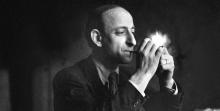Raymond Aron was born in Paris on 14 March 1905, the son of Suzanne and Gustav Aron, a professor of jurisprudence. Raymond attended school at the Lycée Hoche in Versailles and the Lycée Condorcet in Paris. Between 1924 and 1928 he attended L’Ecole Normale Supérieure in Paris, where he studied philosophy. He attained first place in the competitively fought Agrégation de Philosophie.
In 1930 Aron went to Germany, where he spent three years. For the first eighteen months he held a position as a lecturer at the University of Cologne. He spent the remaining time studying at the French Institute in Berlin. He married Suzanne Gauchon in 1933. Since he was a Jewish academic, it is not surprising that he returned to France, spending about a year in Le Havre before returning to Paris. For five years, Aron took the role of secretary to the Centre of Social Information at the Ecole Normale Supérieure, during which time he was awarded a doctor of philosophy degree for his thesis on the philosophy of history.
When war broke out, Aron fought for a year in the French army, escaping to London when German occupation took place in 1940. During his exile, he edited La France Libre. As soon as the war was over, he returned to Paris where he would remain for the rest of his life, continuing as a journalist as well as holding the professorship of Political Science in Sorbonne between 1955 and 1968, and of Sociology in the College de France from 1970 until his death.
While Aron’s output was diverse, he is best known as a sociologically oriented political commentator and philosopher. While Weber and Marx had an inevitable influence on his thought, it was not to the same extent or manner as contemporaries such as Camus or Sartre. Aron’s intellectual roots were set more deeply in the democratic visions of Montesquieu and de Tocqueville. He firmly rejected the sociological and historical determinism of Marxist dogma, defending the utmost importance and value of human freedom.
In both his journalistic and academic work he was critical of his contemporaries on both the right and the left. While he admired some of Marxism’s intentions, he perceived that the French left, in its preoccupation with the Marxist idea of historical inevitability, had become seduced by Stalinism. Defending human freedom and seeking to promote peace on both a national and international level, he opposed those who promoted a centralised and idealised state.
Aron delivered his Gifford Lectures between 1965 and 1966, under the title 'On Historical Consciousness in Thought and Action'.
He died in Paris on 17 October 1983, leaving two children.
Works by Raymond Aron include La Sociologie allemande contemporaine (1936), Introduction a la philosophie de l’histoire (1938), L’Opium des intellectuels (1955), La Lutte de classes: Nouvelles lecons sur les societies industrielles (1964) and On Historical Consciousness in Thought and Action (1965–1966). Robert Colquhoun published a two-volume work entitled Raymond Aron in 1986.



